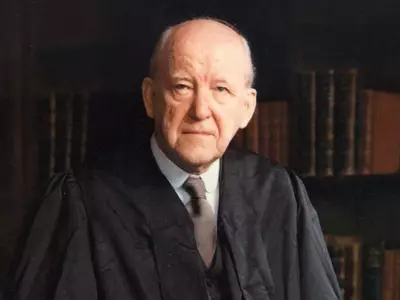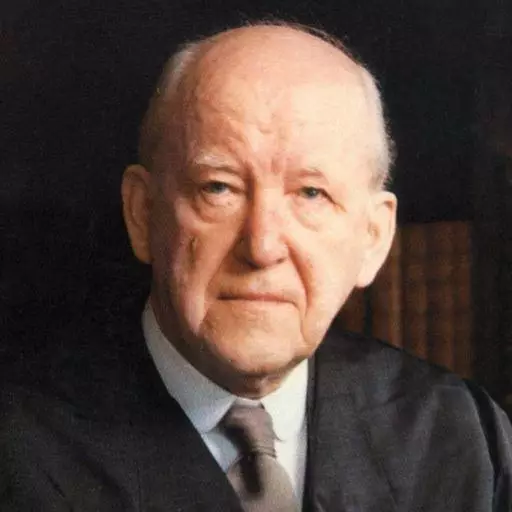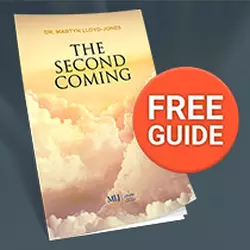
Psalms 149:5-6 — In this sermon from 1977, Dr. Martyn Lloyd-Jones reflects on the state of evangelicalism in Britain over the previous decade since he issues his call for evangelicals to leave their mixed congregations. Focusing particularly on shifts he has observed among Anglican evangelicals, Dr Lloyd-Jones argues that the past ten years has seen a dramatic drift away from historic evangelical positions on Scripture, salvation, and ecclesiology among many who still claim the evangelical label. Dr. Lloyd-Jones sees this exemplified in books like "Growing into Union" and events like the 1977 Nottingham Congress, where he perceives a blurring of lines between evangelicals and Anglo-Catholics. He laments what he views as compromises on biblical authority, cooperation with Roman Catholics, and a move away from Reformation principles. Dr. Lloyd-Jones calls for a renewed "battle for the Bible" and contends that mixed denominations inevitably lead to doctrinal compromise. He urges evangelicals to maintain clear theological distinctives and separation from error, while also cultivating joy and praise to God. The sermon combines theological analysis, historical perspective, and pastoral exhortation as Dr. Lloyd-Jones seeks to rally British evangelicals to stand firm for biblical truth in changing times. He sees the British Evangelical Council as playing a crucial role in upholding historic evangelical convictions against modern trends of accommodation and ecumenism. Throughout, Dr. Lloyd-Jones emphasizes the need for both doctrinal fidelity and spiritual vitality - wielding "the sword" of God's Word while also lifting up "high praises" to the Lord.
March 17, 2025

In this powerful sermon commemorating the 350th anniversary of the Pilgrim Fathers' voyage to America on the Mayflower, Dr. Martyn Lloyd-Jones draws profound lessons from their example for Christians today. He begins by emphasizing the importance of studying church history, particularly this period of transition in the early 17th century which parallels our own age. Dr. Lloyd-Jones outlines the historical context of the Separatist movement that led to the Pilgrims' departure, highlighting their desire for a pure church based on Scripture alone. He praises their godly character, doctrinal orthodoxy, and willingness to sacrifice all for their convictions. At the same time, Dr. Lloyd-Jones notes some of their imperfections, such as attempting to establish a theocracy. The heart of his message focuses on the Pilgrims' view of life as a spiritual pilgrimage and their trust in God's providential care, as evidenced by remarkable circumstances surrounding their settlement in Plymouth. Dr. Lloyd-Jones then issues a stirring challenge to his listeners, asking if they hold to the same doctrines and are willing to act on their beliefs as the Pilgrims did. He argues that their example calls modern evangelicals to separate from theological liberalism, sacramentalism, and ecumenical compromise with Rome. Dr. Lloyd-Jones concludes by exhorting his audience not to honor the Pilgrims hypocritically, but to follow in their path by taking a courageous stand for biblical truth and the purity of the church, even at great personal cost.
March 16, 2025

Matthew 22:15-22 — This sermon by Dr Martyn Lloyd-Jones, one of his last to be recorded prior to his death in 1981, was delivered at the final rally of the British Evangelical Council to take place Westminster Chapel in 1979. In it, Dr. Lloyd-Jones expounds on Jesus's famous teaching to "render therefore unto Caesar the things which are Caesar's, and unto God the things which are God's" from Matthew 22:15-22. Dr Lloyd-Jones uses this passage to address what he sees as the great tragedy of mankind - its refusal to listen to the only One who can truly help, Jesus Christ. Dr. Lloyd-Jones argues that the modern world, like the Pharisees and Herodians who questioned Jesus, is overly preoccupied with lesser matters like politics, social issues, and culture, while neglecting the things of God. He exhorts Christians to follow Christ's example by putting these worldly concerns in their proper place and focusing instead on proclaiming the supernatural reality of God and the dignity of man as made in God's image. Dr. Lloyd-Jones contrasts the limited benefits and authority of earthly rulers like Caesar with the eternal power and blessings of God. He emphasizes that while we should be good citizens, our ultimate allegiance is to God alone, and calls believers to declare to a materialistic world that man does not live by bread alone, but is a living soul made for fellowship with the Creator. Dr. Lloyd-Jones concludes by highlighting the incomparable benefits of salvation in Christ - forgiveness, peace, joy, and eternal life - which far surpass anything the world can offer. He urges Christians to pray fervently for revival and a fresh outpouring of the Holy Spirit to empower their witness in these dark times. This sermon is a stirring call for the church to maintain its focus on proclaiming the gospel and the supremacy of God in a world consumed by temporal concerns.
March 15, 2025

Genesis 26:17-18 — In this powerful sermon on revival, Dr. Martyn Lloyd-Jones draws from the story of Isaac re-digging his father Abraham's wells in Genesis 26. He argues that the church today is in desperate need of revival, facing a crisis of faith and vitality. Dr. Lloyd-Jones contends that the solution is not to seek new methods or adapt to modern times, but rather to rediscover the timeless truths and doctrines that have fueled revivals throughout church history. He emphasizes the importance of studying church history to understand how God has worked in the past and to gain wisdom for the present. Dr. Lloyd-Jones identifies several key doctrines that have been obscured or neglected in the modern church, including the sovereignty and active involvement of God, the authority of Scripture, the sinfulness of man, the centrality of Christ, and the person and work of the Holy Spirit. He argues that these foundational truths have been covered over by false teaching and worldly influences, like the Philistines filling in Abraham's wells. The task of the church today, Dr. Lloyd-Jones asserts, is to clear away these obstacles and rediscover the life-giving "water" of biblical truth. He calls believers to return to a robust, supernatural faith that expects God to work powerfully, rather than relying on human effort alone. Dr. Lloyd-Jones concludes with a stirring appeal for the church to humble itself, learn from the past, and earnestly seek God for a fresh outpouring of His Spirit in revival power.
March 14, 2025

1 Timothy 1:12-16 — In this sermon, delivered to commemorate the life of Dr. G Campbell Morgan, Dr. Martyn Lloyd-Jones explores the making of a preacher, using the example of the Apostle Paul as described in 1 Timothy 1:12-16. He emphasizes that a true preacher is one who has been called by God and has personally experienced God's grace and mercy. Dr. Lloyd-Jones argues against the notion that unbelief is simply a matter of intellect, knowledge, or mental balance. Instead, he asserts that unbelief is a state or condition produced by the devil, characterized by prejudice, dogmatism, and active resistance to the truth. Dr. Lloyd-Jones delves into Paul's transformation, highlighting how he came to realize his own sinfulness and ignorance of God's law, the true nature of sin, and his condemned state before a righteous God. Dr. Lloyd-Jones stresses that this personal experience of conviction and subsequent enlightenment by the Holy Spirit to God's mercy is essential for a preacher. He contends that only someone who has undergone this transformation can effectively communicate the gospel to others. The sermon challenges modern attempts to explain away faith through intellectual, scientific, or psychological means, arguing that these approaches fail to address the fundamental spiritual condition of unbelief. Dr. Lloyd-Jones concludes by emphasizing that the preacher's role is to help others move from darkness to light, from Satan's power to God, so they may receive forgiveness and inheritance among the sanctified.
March 13, 2025

This historical address, delivered by Iain Murray a few months after the death of Dr. Martyn Lloyd-Jones in 1981, reflects on the life and legacy of this great preacher of the gospel. Mr. Murray, a close friend of Dr. Lloyd-Jones and his official biographer, shares personal memories and insights from the final months of Dr. Lloyd-Jones's life. He emphasizes Dr. Lloyd-Jones' deep faith, his preparation for death, and his lifelong commitment to biblical truth. Mr. Murray recounts how Dr. Lloyd-Jones viewed his declining health as an opportunity to prepare spiritually for eternity, rather than lamenting his inability to preach. He highlights Dr. Lloyd-Jones's continued devotion to Scripture reading, prayer, and theological reflection even as his health failed. The address provides glimpses into Dr. Lloyd-Jones's thoughts on death, the sovereignty of God, and the importance of ministers being well-prepared to feed their congregations spiritually. It also touches on key moments in Dr. Lloyd-Jones' life and ministry, including his conversion, call to ministry, and influential tenure at Westminster Chapel in London. Throughout, Mr. Murray emphasizes Dr. Lloyd-Jones's unwavering trust in God's providence and his desire to face death with Christian testimony. The sermon serves as both a tribute to Dr. Lloyd-Jones and an exhortation to other ministers to follow his example of faith, diligence in study, and focus on eternal realities. It provides a deeply personal and moving portrait of one of the 20th century's most significant preachers in his final days.
March 12, 2025

In this sermon on the Protestant Reformation, Dr. Martyn Lloyd-Jones provides a comprehensive overview of the Protestant Reformation and its ongoing relevance. He traces the development of the Roman Catholic Church over the centuries, highlighting how it deviated from biblical teaching through traditions, papal authority, and doctrines like transubstantiation. Dr. Lloyd-Jones then explains how reformers like Martin Luther and John Calvin rediscovered key biblical truths like justification by faith alone and sola scriptura. He recounts how the Reformation spread to different countries, including England. Dr. Lloyd-Jones emphasizes that the core doctrinal differences between Protestantism and Catholicism remain, despite surface-level changes in the Catholic Church. He urges listeners to value and defend Reformation truths, warning against ecumenical movements that compromise the gospel. Overall, Dr. Lloyd-Jones presents the Reformation as a crucial recovery of biblical Christianity that continues to have vital importance for the church today.
March 11, 2025

In this sermon on postmillennialism and the spiritual view, Dr. Martyn Lloyd-Jones continues his series on Great Biblical Doctrines by preaching on the other possible interpretations of Revelation and the end times. The postmillennial view, once popular in mainstream evangelical circles, holds that Christ will not return until after the millennium, which its supporters hold as a period during which the earth will experience a long period of immense blessing and knowledge of the Lord. However, as Dr. Lloyd-Jones points out, the difficulty with this view is that Scripture says the earth will go through an absolutely devastating time before the end. If the postmillennial view isn’t correct, what is? In place of this and the other perspectives discussed in this mini-series, Dr. Lloyd-Jones proposes what he calls the “Spiritual View.” He argues that this section in Revelation and the parallel passages in the gospels point to Satan having been bound and cast out at the time of Christ’s death on the cross. What about the 1,000 reign that Scripture references? Dr. Lloyd-Jones presents why he thinks that it is occurring now and why it is not going to be a future, literal 1,000 year period.
March 9, 2025

In this sermon on the premillennial view of Revelation, Dr. Martyn Lloyd-Jones identifies several errors with the premillennial interpretation of eschatology. First, no other passages in the New Testament reference an earthly kingdom with Jesus literally reigning on earth for 1,000 years. Second, this view makes the kingdom earthly, whereas Jesus’s emphasis is on a spiritual kingdom. Third, it postpones the idea of the kingdom to the future, but this is contrary to what Dr. Lloyd-Jones sees in the New Testament. Fourth, it reintroduces the distinction between Jews and Gentiles that Paul so clearly wrote had been abolished. Fifth, Lloyd-Jones says, it proposes that there are three comings of Jesus, whereas Scripture says that there are two. Sixth, this view says that glorified saints and the Lord Jesus in His glory are on earth together with those who haven’t been glorified yet, but this, too, seems contrary to what Scripture teaches. Finally, it is inconceivable that if Christ reigns for 1,000 years that Satan will be able to produce an army large enough to wage war against Christ, even though they will be defeated. Listen to this sermon as Dr. Lloyd-Jones expands on these points and helps the listener understand the flaws with a premillennial view of the end times.
March 8, 2025





